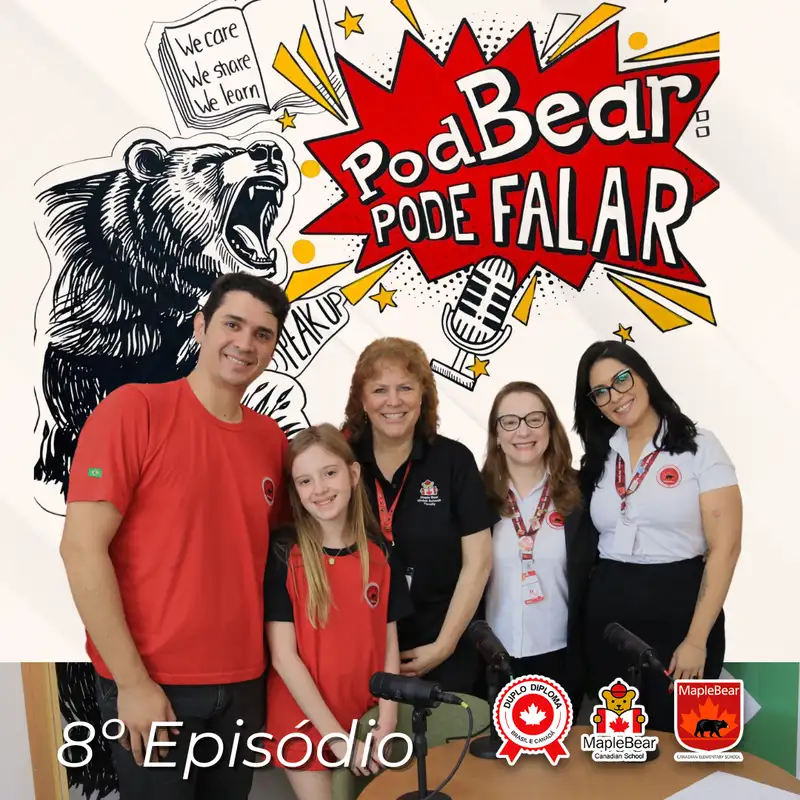 Episódio 8
Episódio 8
· 07:18
00:00 Speaker: Hello, Maple Bear. Good morning, Bears. Welcome to one more episode of Pode Bear, Pode Falar. Today I have with me two very special guests. I have Isa Vieira from Year 6 and Miss Cassie Lane, our Quality Assurance Reviewer, here with us this week, to talk about some very relevant topic, which is education, but one of the most important aspects, the quality of education.
00:28 Speaker: Welcome. Welcome, Cassie. Welcome, Isa. Thank you for joining us. Cassie, for Isa and some of her friends, the term quality or quality assurance may sound kind of technical. So I'd like to go a little bit back on that and first ask from Isa. Isa, when you think about quality in your education, what comes to your mind?
00:55 Speaker: I think quality education is an education that we can really learn, we can participate, answer questions, ask, and really understand the topic. And when you say really learn, how do you see that in your daily school days here at Maple Bear? It's that we didn't, we don't.
01:25 Speaker: We don't, like, memorize. We learn and know about what we are talking and learning. Okay. So, I believe that you prepared some questions for Miss Cassie. Yes? So, Miss Lane...
01:51 Speaker: Could you tell us a little bit about your expertise and why you are visiting our school? Sure. So I'm a retired Canadian principal, so I worked in education in Canada for over 30 years. And now I am... so lucky to be working with Maple Bear Global Schools. And so I come down to Brazil and I visit schools in my role as a quality assurance reviewer. And so when I come to the schools, I work with staff, I talk to students, I observe, I do really cool podcasts. This is a new one. And basically, I am seeking to understand and
02:37 Speaker: Having the school provide evidence around four different areas. So we look at, are we learning according to the Maple Bear methodology? Are we leading and managing the building? Are we assessing and evaluating the work? And also, how are the teachers teaching? What type of instructional strategies are we doing? So that's my role.
03:04 Speaker: Speaking of which, Ms. Lane, what would you say are Maple Bear's strengths when it comes to quality in education? So I think Maple Bear Global Schools does a really good job at creating lifelong learners, right? So when a student is self-directed, becomes independent and is in charge of their learning.
03:30 Speaker: That's called student agency, right? In Maple Bear, what we do through student-centered learning is we not only learn, but we want you to develop curiosity and wonder about the world. We want you to be critical thinkers. So we want you to ask questions, right? Not just accept that there's one right answer, right? And so those are kind of the things that I see when I come to these beautiful schools here in Brazil.
04:04 Speaker: Cassie, is there any other aspect of maple bear methodology that you think are crucial to the future, like talking about the future of education or for our modern society and where society is heading to?
04:42 Speaker: I think at Maple Bear, I think we want our students, as I said, to be critical thinkers and problem solvers. We want them to be able to communicate. We want them to be able to disagree. But really, it's about them taking ownership of their own learning, asking questions, right? Being present and going beyond.
05:07 Speaker: what is in the curriculum. The curriculum is a guide and we cover the curriculum for sure. We want our students to uncover the curriculum. Great. And talking about ownership and agency, do you think that students like Isa and others, they play a role in the quality of their own education and how is that? Well, I think when students are active participants in the learning,
05:36 Speaker: in the school. This is a perfect example, right? Participating in a podcast is an absolutely beautiful example of students taking ownership, and we want to make sure that we create the conditions for student voice and choice, right, in our Maple Bear programming. So yes, they are it. They are the most important part of this, right?
06:03 Speaker: And you, Isa, do you think that you have a role? How do you take care of the quality of your own education? How do you think that you contribute to that, to have a good education, you yourself? What's your part in that? I think that doing home connections, activities, and paying attention to the class, I can contribute.
06:32 Speaker: to my education. And do you think that you also collaborate with the quality of your friend's education? And how? Like, how do you collaborate with each other's education? When we work in group, we can learn a lot with each other and learn things that we didn't know before.
06:56 Speaker: I would say, too, one of the things that I've noticed in this school, too, is that students are involved and they understand what the learning goal is, right, and the success criteria. So how do you get to that? And there's lots of conversation and feedback to help students to do their, reach their potential, right? Thank you.
07:49 Speaker: So thank you, Isa, for being here this morning with us. Thank you, Ms. Lane. It was a very precious conversation. And thank you, everyone, for listening to us. Stay tuned and listen to our next episodes. Our next one is coming on Friday. Thank you very much. Thank you. Thank you.
Ouvir o PodBear usando um dos muitos aplicativos ou diretórios de podcast mais populares.